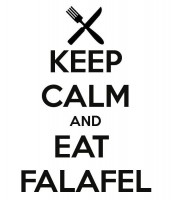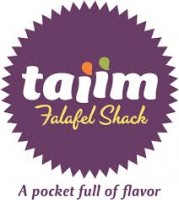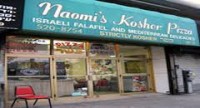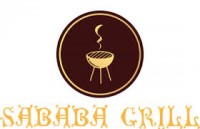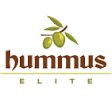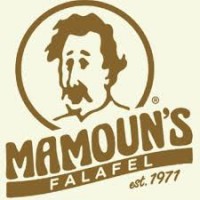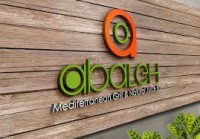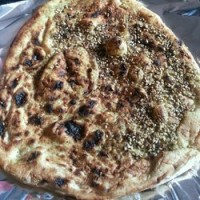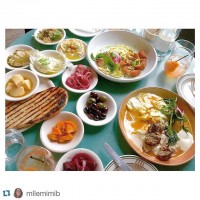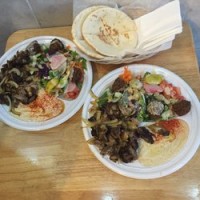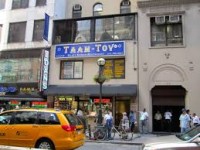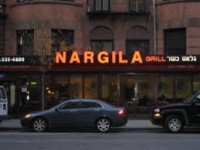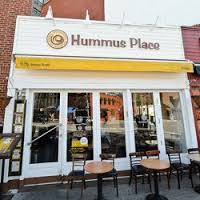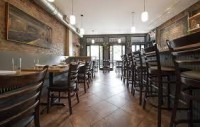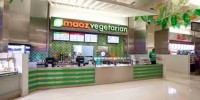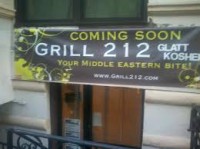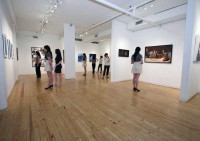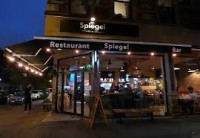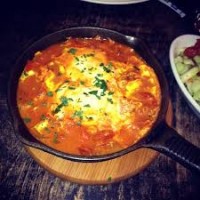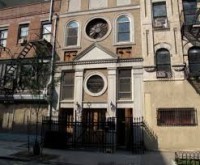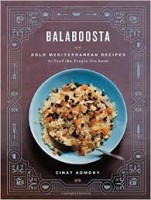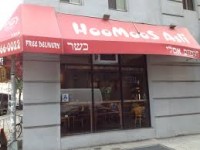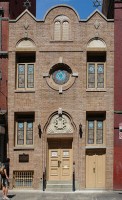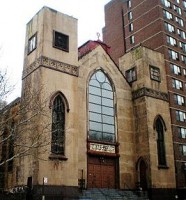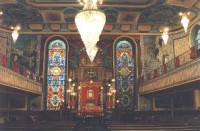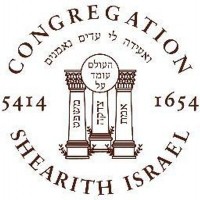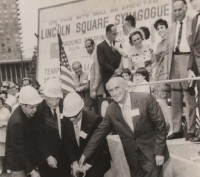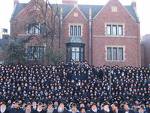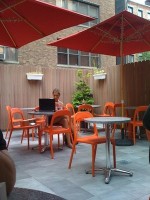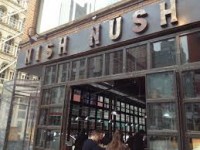חוות דעת על המקום:
has a super whipped, creamy consistency to it that pairs well with the more well seasoned food. Had the chicken tabouleh and it was superb. The staff is high energy but down to schmooze when its not as busy. The owner, Ronnie, is super passionate about bringing good service and making you feel at home. Kosher/Halal friendly! Would recommend
Really calm and casual spot with charm.
Nice for a date or outing with small group of friends. Was there for early dinner Saturday post Broadway show. Small staff was very busy but managing to keep waits reasonable.
The hummus was great, and my date had soup for starters which she really enjoyed.
She had chicken and couscous and I had the Moroccan fish and couscous. Both dishes were in a stew type sauce. I asked for low spice version of the Fish, but it was still quite spicy yet tasty. The hot apple cider with brandy was a highlight for me. Desert choice limited but we still found something to share which we enjoyed, was similar to Turkish delight. Just to note, they have a very limited bar and the food is Kosher but no less cool or interesting. Overall we enjoyed it and would come back again.
Great restaurant in Hell's Kitchen with many vegetarian options– mostly vegetarian and vegan with some meat available. Really good & smooth hummus here! Tons of different types of hummus- plain, chickpea, tahini, mushroom etc (basically the same base hummus with different toppings). The hummus platter is great for sharing.
I love that they serve warm fluffy whole wheat pita as an option!! Much better than plain white pita. The whole wheat pita was very soft and yummy. They don't serve a lot at a time so you have to keep asking if you want more.
There is a variety of salads, entrees and a "tapas-like" options where you can pick three different items. Really good selection of clearly-market vegan options! I had the falafel, cauliflower (AMAZING) and tomato/cucumber salad.
I would recommend hummus kitchen for a healthy plant-based meal. The restaurant was nice with a good atmosphere. Not overly crowded either. Service and prices both acceptable.
- ספרים למנויים reviewed לפני 8 שנים
Hummus Kitchen is a fun restaurant in a good area closet to Times Square. When we first arrived we immediately got seated however it took quite some time for a waitress to come take our order. Once the waitress came she was very unprofessional and said ughhhh finally I can take yalls order – what do you want. Very cold, and unfriendly. She complained that they were busy and just got a rush when we arrived.
When we had questions about the food she was very short with her answers and talked to us as if we were dumb even though the menu did not state answers to our questions. She was very nice and allowed one of the people in my group try the lemonade bc he asked if it was good; however, it took her what seemed forever to act silly bring the drink. Getting our glasses even filled with water was quite the hassle for her as well.
When the food finally arrived it was very good. I got the shawarma wrap and I really enjoyed it. Very good favor and a good size. Not overly large but still filling. Everyone in my party enjoyed their food.
- You must login to post comments
Agora Gallery was established by the late Miki Stiles, MFA, to provide opportunities to artists entering the global art market. Ms. Stiles was a visionary who founded the gallery on the principle that all artists benefit from having their artwork promoted by a professional gallery. Located in the heart of the famous Chelsea art district, Agora Gallery occupies both the ground and second floor of 530 West 25th Street. The gallery is frequented by art lovers looking to find and buy original artwork.
If you’re an art lover visiting New York, you won’t want to miss the experience of exploring Chelsea, the gallery district internationally renowned for the diversity and talent it displays. Alongside visiting the city's established art institutions such as the Metropolitan Museum of Art and the Museum of Modern Art, no trip would be complete without time spent in Chelsea. Agora Gallery is a great example of a gallery that showcases the variety and skill present in contemporary art – so be sure to visit Agora Gallery during your time in New York! In both its spacious street level space and the welcoming second floor gallery above, Agora Gallery exhibits a range of mediums, styles and subjects – so you're bound to find original fine art that speaks to you. Admission is free to all.
Gallery Hours: Tuesday-Saturday 11am – 6pm.
There are always exciting events happening at Agora Gallery, and our location in Chelsea, New York's celebrated Chelsea district, means that we are constantly attuned to the pulse of the art scene, both locally and globally. The best way to receive regular updates is by subscribing to our mailing list, and if you’re wondering about the latest news connected to the gallery and our represented artists, explore our blog. From exhibitions to expansions, you'll be kept up to date with the developments that impact Agora Gallery directly and indirectly, including the trends that sweep the art community in the district, the city and the world.
Situated in the heart of Greenwich Village in New York City, Mamoun’s Falafel has been serving high quality Middle Eastern Food since it first opened its doors to the public in 1971. It is the oldest falafel restaurant in New York and one of the first Middle Eastern establishments in the United States.
Family owned and operated since the beginning, the restaurant is now part of the history and culture of the Village. Its tradition extends to serving the likes of many famous musicians, actors, and other celebrities. There is an energy and flare to the place that cannot be captured in words. Whether it’s the tiny “hole in the wall” charm, the high paced/ high volume energy, or the dynamic clientele, going to Mamoun’s for a falafel can transform a meal into a unique dining experience. Through the years, we’ve been featured on the food network, travel guide channel, and many newspapers, magazines and books.
What sets us apart from other Falafel restaurants is our rich tradition and history as well as our commitment to excellence. Our philosophy is simple: authentic Middle Eastern Cuisine served in a traditional environment. Everything we serve is made from scratch using only the freshest natural ingredients, the finest imported spices, and our signature recipes.
So come down and visit one of our locations. Whether it’s our flagship restaurant in Greenwich Village, our East Village location, our New Haven “sit-down” restaurant, or our newest spots in Hoboken, New Jersey, and New Brunswick, New Jersey, you are sure to get the same high quality food, fast service and budget prices.
And remember, accept no substitutes. Although many have tried to imitate us, there is only one Mamoun’s Falafel.
If it doesn't say Mamoun's, then it's not Mamoun's!
Falafel sandwich with hummus. It's worth the extra dollar, even though you might be thinking "Why would I load up on more chickpeas?" You can tell they don't skimp on the tahini, and it has the perfect level of saltiness. Their hot sauce also makes a great gift for those loved one who really love their eggs spicy. We're talking lip-chapping, tear-inducing levels of harissa. It's heavenly.
The Jewish Community Center – Chabad of West Queens
Mission Statement
To assist the residents of West Queens, achieve their spiritual, physical and emotional goals through exemplary educational, religious, cultural and social programming and celebration.
To provide support in times of need, illness or emergency
To promote and strengthen Jewish awareness, pride and identity to all Jewish individuals and families regardless of affiliation or background
To provide a warm community home where everyone is made to feel welcome & comfortable.
About our Center
The JCC – Chabad LIC was created with one goal in mind – to offer all Jews, even those with little or no background – a home, and an education and memories that will inspire them for a lifetime. We strive to evoke a sense of history, love for the land of Israel, and a genuine understanding of what Judaism is all about, and thereby develop strong Jewish pride.
Our center is founded on the principle that, while people embrace many levels of observance in their personal lives, there should be a place for no labels, and all affiliations. A place where people can develop a sense of community and enhance their own spiritual experiences of Judaism.
We realize that when it comes to spirituality, it is NOT "one size fits all." We have therefore created a multifaceted program with various sub organizational departments to cater to the different needs of the many parts which comprise a community.
Each department is managed by an individual of our staff that is fully dedicated to the development and expansion of that division. We aim to ensure maximum efficiency and quality of its programming so that everyone's needs can be catered to with the appropriate attention.
Whatever department you are involved with, the trademark feeling of warmth and creative spiritual excitement flows through every program. We provide everyone with a taste of joyful Judaism according to their own specific interests, while at the same time being part of the larger community through its dynamic unifying energy of love, acceptance and commitment to non judgmental spiritual growth.
rabbi and wife.jpgAbout Rabbi Zev and Rivka
Rabbi Zev Wineberg was born in Vancouver. From the age of twelve, he started Yeshiva, traveling within Canada, USA, South Africa, Israel and Budapest.
Rivka was born and raised in Crown Heights, Brooklyn, and from a young age began volunteering in Jewish day camps throughout the US, and Ukraine. She studied in Israel and upon completion began teaching within the Chabad community.
Both knew they wanted to work within the framework of Jewish Community Service.
In 2006, with the guidance of the Lubavitcher Rebbe, of blessed memory, Rabbi Zev & Rivka Winberg were given the opportunity to expand the work of Lubavitch in West Queens, by beginning to serve the spiritual needs of the Jewish population in the up-and-coming neighborhood of Long Island City. It is a fast growing suburb – attracting many Jews. There was a need to reach out to an overwhelming population which was uncommitted and under affiliated.
Zev and Rivka came with an agenda of Ahavat Yisrael, unconditional love for every Jew, to assist, help and infuse the community with the exciting programming and Jewish experience that have become synonymous with this vital organization. Through innovative programming such as public Menorah lightings, Passover Seders, lectures and cultural events, holiday workshops for children, The JCC – Chabad LIC quickly became a household name, reshaping the landscape of the Jewish experience in West Queens.
About The LIC Synagogue
Imagine worshipping in an atmosphere of total inclusion and acceptance, where you are welcome and encouraged to ask questions, where you are implored to be as non-judgmental of your neighbors as they are of you. This is the atmosphere that has been created in this Shul which we call home. Friday night services are lively Carlebach style and followed by L'Chaim and Kugel. Shabbat services are traditional and include a Dvar Torah – contemporary Torah thought from Rabbi Zev. The weekly Kiddush is focused on celebrating milestones in the community and our families.
All Jews are welcome regardless of background, knowledge, or level.
Imported coffee
Checkout our various tyes of imported coffee.
Great Music
Our DJs will entertain you like never before.
Finest Cuisine
From Italian to Tex-Mex, you will find all types of food
Nice Staff
You will never forget our smile and professional attitude.
When my husband and I were in the East Village to see an off, off Broadway show, we happened across this eclectic eatery called Spiegel. We both loved the choices of interesting international dishes. I had the fish tacos which were excellent, with two big pieces of Mahi. My husband had the Tunisian sandwich which is a creation of marinated tune, chick peas, potatoes and harissa. He described it as tuna with layers of flavors and textures. We will be coming back the next time we are in the neighborhood.
אין חוויה ישראלית יותר מלשבת במסעדת "12 כסאות" המעולה ולאכול ג'חנון, פלאפל, מג'דרה או קוסקוס ביום שבת בבוקר עם חברים. בדרך כלל זמן ההמתנה ארוך, אבל ככה זם עם מסעדות טובות, אבל ההמתנה בהחלט משתלמת. מומלץ !
We’re doing something special for Purim this year, and the more of you participate, the more special it will be! Sign up for our first-everMishloach Manot Project to send your friends and fellow Stanton members traditional Purim food baskets. We prepare them for you, you sit back and enjoy Purim, proceeds go to the shul, and everybody wins!
How does it work? You should already have received an e-mail with instructions and your very own log-in code. Simply log-in to the Purim Project site and select the people you want to send to from the list of participants ($5/person or $180 for as many names as you want). The baskets will be available to be collected at the shul on Purim night,March 23, and Purim morning, March 24, when you come for megillah reading. (Please note, each participant receives one basket with a list of all the people who gave to them.)
We are honored to host the Honorable Martin Shulman this Shabbat, February 6, for a special talk in honor of Parashat Mishpatim (Laws). Judge Shulman’s talk on “Selected Torah and Secular Social Laws – No Need to Re-invent the Wheel,” will take place at 12:15pm, after kiddush, and will be followed by mincha. All are welcome!
Celebrate Shabbat with Stanton and the rest of America next week!
We will be having a community Shabbat dinner on Friday night,March 4, for the nationwide Sabbath observance known as Shabbat Across America. Click here to sign up now! The cost is $35/person or $30 for shul members. Sponsorships of $100 include dinner for two. Please let us know if you would like a vegetarian entree.
In February of 2004, partners Danny and Ayala Hodak and Gadi and Sheila Ruham open the doors of Taboon Restaurant on a quiet corner in Hell's Kitchen where the star of the show is the blazing white domed oven that has been serving up its original wood fired "Middleterranean" cuisine ever since.
Inspired by the vibrant spices and flavors of the Middleast and the Mediterranean, with fresh hand made food from an ancient oven, bold and articulated flavors, and a driving passion for food and love for hospitality, Taboon quickly earned a loyal following and a well respected place in New York's culinary landscape.
בקורת:
Yes, the bread is delicious! The dips were fine. We went for brunch. We tried 3 different kinds of shakshuka. They were good, but not amazing. I actually liked the khassa salad best. It had pickled radishes, beets, feta, pomegranate seeds, greens and more.
Food is terrific. Service, by nice people, was very slow. I had read the reviews before going the first time (tonight) and the only knock on the restaurant was that on a cold night it would be best not to sit in the front room. That's where our reserved table was and when I protested got a real "attitude" from the large lady at the "front desk". I did an imitation of Donald Trump and we were very quickly showed to another table. She commented that I was being "feisty". Now why on earth was that necessary?
The creation of husband-and-wife team Chef Einat Admony and Stefan Nafziger, this “Mediterranean meets Middle East” restaurant has a diverse and playful menu that draws inspiration from Chef/Owner Einat Admony's Israeli roots. Weekly specials based on local seasonal ingredients and an extensive list of organic wines from that region demonstrate the personal touch that has made Taïm a critically acclaimed success. Chef Admony’s newest project, Bar Bolonat, is now open at 611 Hudson Street!
The Balaboosta cookbook is now available at your favorite bookseller – or pick up a signed copy at the restaurant!
Nestled among the faux bistros and precious bars of Nolita, Hoomoos Asli is a welcome, no-fuss spot offering quick and cheap Israeli cuisine. Ceiling fans whirl above small wooden tables and cheesy '90s trance music plays over the speakers. Lunch draws a large international crowd of 20-somethings and NYU students, who come to feast on falafel, which arrive tucked in homemade, ridiculously fluffy pitas overflowing with chopped tomatoes and cucumbers. Dinner boasts an equally laid-back scene as couples enjoy entrees like schnitzel, pan-fried chicken covered in breadcrumbs and spices, and the Jerusalem mixed grill, a succulent combination of lamb, chicken and beef served with caramelized onions over rice. Lingering over cups of Turkish coffee and talking politics is encouraged. And although Hoomoos Asli doesn't serve liquor, the bring-your-own-wine-and-beer policy adds to this hole-in-the-wall's casual charm. — Dakota Smith
Recommended Dishes
Babaganoush, $5.17; Jerusalem mix grill sandwich, $11.16
Park East Synagogue is dedicated to providing the opportunity for spiritual growth, Jewish education and spiritual comfort for individuals, families, and our community.
Park East Synagogue is inclusive of all people seeking a meaningful Jewish life, regardless of degree of observance, knowledge of Jewish tradition, age, or affiliation.
Park East Synagogue is committed to providing inspiring Jewish and general studies education to children and to adults; its Religious School, Early Childhood, and Day School with its emphasis on cultivating a Jewish life rich in tradition and unrivalled in general studies has been, and continues to be, a source of character and vitality for its congregation.
The synagogue’s influence, strength and dynamism in the community derive from the members of our congregation. We value and honor the role our congregants fulfill in defining and shaping our future and that of the Jewish community, in New York City and beyond.
Shacharit
February 28 at 9:00 am EST
February 29 at 7:45 am EST
March 1 at 7:45 am EST
Mincha
February 28 at 5:40 pm EST
February 29 at 5:40 pm EST
March 1 at 5:40 pm EST
I'm not going to leave a synagogue less than a five star but I'm a little confused why I was kicked off the steps of the back entrance. I have never seen anyone come in or go out that way. I'm Jewish. There are cameras everywhere and a Police station a few doors down. They are not paticularly comfortable steps to sit on. The reason I like to sit on those steps is because it's a temple and also because it's close to Police. A few criminals are paying people to harass me every day and when I'm on those steps is the only time they leave me alone. Thanks guys
קהילה קדושה יאנינה הוא בית כנסת הנמצא ברחוב ברום (Broome) 280 בין רחובות אלן (Allen) ואלדרידג' (Eldridge) בלואר איסט סייד במנהטן ניו יורק. הוא נבנה בשנים 1925-1927 ותוכנן על ידי סידני דאוב. הוא בית הכנסת היחיד בחצי הכדור המערבי שנוהגים בו בנוסח הרומניוטים השונה גם מנוסח אשכנז וגם מנוסח ספרד.
לקהילה קדושה יאנינה יש ייחוד בהיותו בית הכנסת הרומניוטי היחיד בחצי הכדור המערבי הקהילה נוסדה ב-1906 על ידי מהגרים יהודי יוונים מיואנינה, אבל בית הכנסת לא הוקם עד 1927. השנים מאז ועד מלחמת העולם השנייה היו שנים של שפע לקהילה הרומניוטית בלואר איסט סייד. כיהנו בבית הכנסת שלושה רבנים ובימים הנוראים היה בית הכנסת מלא מפה לפה. אחרי מלחמת העולם השנייה עבר חלק גדול מבני הקהילה לרבעים אחרים וחלקים אחרים של מנהטן כולל הרלם, ברונקס וברוקלין. קהילות אלה כבר אינן פעילות היום. למרות שהקהילה התמעטה באופן קבוע מאז ימי הזוהר שלה לפני המלחמה הרי עדיין מתקיימות תפילות בבית הכנסת בשבתות ובחגים. למרות שיש לבית הכנסת רשימת תפוצה של 3,000 אנשים הרי, לעתים קרובות, חסרים אנשים למניין בתפילות השבת. סיורים מודרכים מתקיימים בכל יום ראשון למבקרים. לקהילת יאנינה יש חלקה בבית העלמין בוולווד (Wellwood). שם יש גם מצבת זיכרון ליהודי יאנינה שנספו בשואה.
הבניין נוסף לרשימה הלאומית של מקומות היסטוריים ב-30 בנובמבר 1999 וצוין כנקודת ציון של העיר ניו יורק ב-11 במאי 2004 . הוא עבר שיקום נרחב ב-2006.
Congregation Kehila Kedosha Janina
A small synagogue in New York City's Lower East Side is reaching out to make people aware of its congregation's heritage through a museum that familiarizes people with its customs and history.
The synagogue is virtually unchanged since being built in 1927 by Romaniote Jews from Janina, Greece. In 2004, it was designated a landmark by the City of New York.
Both memorabilia and the museum's tour guides describe the story of the Romaniote Jews, from their entry into Greece in the first century to their current life in America.
Differences between Greek Romaniote Jews and the Greek Sephardic Jews who fled from Spain to escape the Inquisition are featured: The two groups speak different languages and have distinct customs.
The synagogue is open for Shabbat services at 9:00 a.m. and on holidays. Look for the schedule of "Holiday Services" on our sidebar menu.
The Museum is open from 11:00 a.m. to 4:00 p.m. on Sundays, or please contact us if you wish to have a special appointment.
Not to be confused with Beth Hamedrash Hagadol Anshe Ungarn, "Great House of Study of the People of Hungary", a Lower East Side congregation founded in 1883 by Hungarian Jews.
Beth Hamedrash Hagodo: בֵּית הַמִּדְרָש הַגָּדוֹל, "Great Study House "is an Orthodox Jewish congregation that for over 120 years was located in a historic building at 60–64 Norfolk Street between Grand and Broome Streets in the Lower East Side neighborhood of Manhattan, New York City. It was the first Eastern European congregation founded in New York City and the oldest Russian Jewish Orthodox congregation in the United States.
Founded in 1852 by Rabbi Abraham Ash as Beth Hamedrash, the congregation split in 1859, with the rabbi and most of the members renaming their congregation Beth Hamedrash Hagodol. The congregation's president and a small number of the members eventually formed the nucleus of Kahal Adath Jeshurun, also known as the Eldridge Street Synagogue. Rabbi Jacob Joseph, the first and only Chief Rabbi of New York City, led the congregation from 1888 to 1902.Rabbi Ephraim Oshry, one of the few European Jewish legal decisors to survive the Holocaust, led the congregation from 1952 to 2003.
The congregation's building, a Gothic Revival structure built in 1850 as the Norfolk Street Baptist Church and purchased in 1885, was one of the largest synagogues on the Lower East Side. It was listed on the National Register of Historic Places in 1999. In the late 20th century the congregation dwindled and was unable to maintain the building, which had been damaged by storms. Despite their obtaining funding and grants, the structure was critically endangered.
The synagogue was closed in 2007. The congregation, reduced to around 20 regularly attending members, was sharing facilities with a congregation on Henry Street The Lower East Side Conservancy was trying to raise an estimated $4.5 million for repairs of the building, with the intent of converting it to an educational center. In December the leadership of the synagogue under Rabbi Mendel Greenbaum filed a “hardship application” with the Landmarks Preservation Commission seeking permission to demolish the building to make way for a new residential development. This application was withdrawn in March 2013, but the group Friends of the Lower East Side described Beth Hamedrash Hagodol's status as "demolition by neglect"
Weekly Shiurim:
Rav Singer Chevra Mishnayos Shiur: Daily between Mincha & Maariv
Mishna Berura Yomis: Daily after Maariv
Daf Yomi by Rabbi Fishelis: Sun – Thu at 8:00 PM
Mishlei Shiur: Sunday mornings, 7:45 AM
Women's Shiur in Tehillim: Monday
Rabbi Romm's Ha'amek Davar Shiur for men and women: Wednesday at
9 PM
Torah Topics: given by Rabbi Mayer Friedman. Friday mornings, 9:15 – 10:15 AM
Shabbos Shiurim:
Rabbi Romm–1 hour before Mincha
Daf Yomi–1 hour before Mincha
The Bialystoker Synagogue was organized in 1865 on the Lower East Side of New York City. The Synagogue began on Hester Street, moved to Orchard Street, and then ultimately to its current location on Willet Street, more recently renamed Bialystoker Place.
Our congregation is housed in a fieldstone building built in 1826 in the late Federal style. The building is made of Manhattan schist from a quarry on nearby Pitt Street. The exterior is marked by three windows over three doors framed with round arches, a low flight of brownstone steps, a low pitched pedimented roof with a lunette window and a wooden cornice. It was first designed as the Willett Street Methodist Episcopal Church.
In the corner of the women’s gallery there is a small break in the wall that leads to a ladder going up to an attic, lit by two windows. Legend has it that the synagogue was a stop on the Underground Railroad and that runaway slaves found sanctuary in this attic.
In 1905, our congregation, at that time composed chiefly of Polish immigrants from the province of Bialystok, purchased the building to serve as our synagogue. During the Great Depression, a decision was made to beautify the main sanctuary, to provide a sense of hope and inspiration to the community. The synagogue was listed as a New York City landmark on April 19, 1966. It is one of only four early-19th century fieldstone religious buildings surviving from the late Federal period in Lower Manhattan. Richard McBee and Dodi-Lee Hecht have both written in-depth articles about the building.
In 1988 the Synagogue restored the interior to its original facade, and the former Hebrew school building was renovated and reopened as The Daniel Potkorony Building. It is currently used for many educational activities. Our most recent project was the refurbishing of our windows.
The Synagogue has continued to be a vibrant and reputable force in the religious world. In recent years a substantial number of new families have chosen to make it their place for prayer and study.
Young Israel: Past, Present and Future
"The aims and purposes of the organization shall be to foster and maintain a program of spiritual, cultural, social and communal activity towards the advancement and perpetuation of traditional Torah-true Judaism; and to instill into American Jewish youth an understanding and appreciation of the high ethical and spiritual values of Judaism and demonstrate the compatibility of the ancient faith of Israel with good Americanism.
The organization shall promote cooperation among the constituent branches now existing and which may hereafter be formed, establish a close bond of kinship to the end that their individual and common problems may more easily be solved, and act as the federated and central body for the Young Israel Movement so that its influence as a force in Jewry may be felt and recognized in America and the world over."
(from the Preamble of the National Council of Young Israel Constitution)
Young Israel was born in 1912, when the primary aspirations of most American-born Jews were economic success and acceptance in American society. Jewish education was very low on their list of priorities, and as a result, was usually rudimentary, at best. Orthodox synagogues were exclusively Yiddish-speaking and permeated by an Eastern European atmosphere. American-raised Jewish youth who wandered into these synagogues typically found themselves shut out completely. It is not surprising that the Jewish youth of that era generally avoided the synagogue, attending only when expected by family custom. Although intermarriage was relatively rare, the distance between young Jewish hearts and minds and Jewish belief and practice was almost huge. It was in this environment that Young Israel was founded by a group of 15 visionary young men and women.
Its first activities were Friday night lectures in English (which was very controversial) on a variety of topics of Jewish interest. Three years later, the group formed a "Model Synagogue" with innovations designed to attract American-raised English-speaking Jewish youth, including participatory singing and youth programs. To enable people of all means to fully participate in synagogue services, Young Israel prohibited the auctioning of synagogue honors. The National Council of Young Israel required the minimum halachic standards of a mechitza, closed parking facilities on Shabbat and Yom Tov, and that each of its synagogues officers be Shomer Shabbat. Young Israel synagogues popped up across North America.
Young Israel envisioned itself as much more than a conglomeration of synagogues. Young Israel was the first on secular college campuses, with over 20 kosher dining halls and intercollegiate programs. Young Israel created an Employment Bureau for Sabbath Observers, in an era when most employees were expected to work 6 days a week. At Young Israel’s headquarters in New York, arms were packed for the Haganah defense forces of the not-yet-born State of Israel. The Free Soviet Jewry Movement was championed by the leadership of Young Israel. Young Israel has always been fiercely Zionistic, and promoted the rights of Jews to live throughout the Land of Israel. Young Israel placed an important role in gaining broad acceptance for advocating for the commuting of Jonathan Pollard’s sentence.
Today the National Council of Young Israel provides professional advice and cost-saving initiatives to 135 Young Israel synagogues (and beyond), advocates for the interests and views of our 25,000 member families, trains aspiring rabbis, supports rabbis in the field with biweekly question and answer sessions, aides communities in rabbinic searches and relations, coordinates informative Gabbai2Gabbai conference calls, provides exciting Parsha Nation curriculum for synagogue youth groups, runs inspiring Achva Summer Teen Experiences, shares best practices through monthly e-publications Shul Solutions and The Practical Pulpit, runs a three division basketball league in the New York metropolitan area, and serves as the sponsor of four senior centers at Young Israel synagogues which feed, educate and recreate the generation that made Young Israel great.
Future plans include providing spiritual inspiration and connection for Young Professionals and training Ashkenazic rabbis how to serve their Sephardic congregants. We are committed to work to maximize the resources of the Jewish community by working with our colleagues at other Jewish organizations and Jewish institutes of higher education and to maintaining a standard of excellence in everything we do.
על המקום:
This place is fantastic. The best food and the best value for money in Greenpoint. The shwarmas were extraordinarily delicious. The food is great quality and the deserts are amazing. Best rice pudding that tastes of pistachio and rosewater. Best baklava ever. And the food comes fast. Also, I was in the restaurant one day too, and the staff were very warm and friendly. Eat in or take out – you won't be sorry.
Really good! And pretty fast. Everything was very tasty and fresh, and the portion sizes were huge: we ordered a mixed vegetarian starter platter (which also comes with falafel as a surprise!), a falafel plate, and a chicken shawarma plate, and there was enough food for 4 meals. And we're BIG eaters. Everything came with loads of fresh pickles, salads, and side additions, and they sent PLENTY of sauces: Very happy, will definitely order from here again.
זמני פתיחה:
Delivery Hours
Mon
6:45PM – 4:30AM
Tue
6:45PM – 4:30AM
Wed
6:45PM – 4:30AM
Thu
6:45PM – 4:30AM
Fri
6:45PM – 4:30AM
Sat
6:45PM – 4:30AM
Sun
6:45PM – 4:30AM
Pickup Hours
Mon
6:45PM – 4:30AM
Tue
6:45PM – 4:30AM
Wed
6:45PM – 4:30AM
Thu
6:45PM – 4:30AM
Fri
6:45PM – 4:30AM
Sat
6:45PM – 4:30AM
Sun
6:45PM – 4:30AM
קהילת שארית ישראל נוסדה במנהטן, ניו יורק בשנת 1654, על ידי מגורשי ספרד ופורטוגל, ונחשבת לקהילה היהודית הוותיקה בארצות הברית. בית הכנסת של הקהילה, המכונה גם "ספרדי-פורטוגזי" ("Spanish and Portuguese"), מתפקד כאורתודוקסי. ממוקם ברחוב 70 (מערב), ניו יורק.
הקהילה נוסדה ב-1654 על ידי 23 מהגרים יהודיים, שבאו מברזיל, ונחשבת לקהילה היהודית הממוסדת הראשונה בארצות הברית.[דרוש מקור] במשך השנים, השתתפו חברי הקהילה במאבק למען זכויות אזרחיות ליהודי ארצות הברית, ובהדרגה השיגו את מבוקשם. מכיוון שהקהילה הייתה הקהילה היהודית היחידה בעיר ניו יורק עד שנת 1825, שארית ישראל תפקדה בתור המרכז של החיים היהודיים, סיפקה מקום לתפילה ולימוד – הן חילוני והן תלמוד תורה, כמו גם מקום לשירותים דתיים (אוכל כשר, מקווה וכו') ומפגשים חברתיים.
Weekday Services January 31 – February 5, 2016 5776 – Mishpatim – Sunday – Friday – January 31 – February 5, 2016
SCHEDULE
Morning Services
Sunday 8:00 am
Monday – Friday 7:15 am
Sunday – Thursday 6:30 pm
Shabbat Services February 5 – 6, 2016 Mishpatim – 5776 – Friday Eve & Saturday – February 5 – February 6, 2016
SCHEDULE
Friday
Candle Lighting 5:00 pm
Services 5:00 pm
Saturday
Morning Services 8:15 – 11:45 am
Torah Reading: Mishpatim
Seuda Shelishit & Class 3:55 pm
Minhah & Arbit 4:55 pm
Sunset 5:19 pm
Habdalah 5:48 pm
LSS is a diverse and vibrant Modern Orthodox Congregation that provides religious, social, and educational services and outreach to the unique Jewish community of the Upper West Side. The synagogue strives to be a model in the integration of Halachic Judaism and contemporary life to the broader Jewish community.
In 1964, in the living room of an apartment in Lincoln Towers, a part-time rabbi from Yeshiva University named Steven Riskin took the budding Lincoln Square Conservative Synagogue by storm. His originality, charm and boundless energy captivated members and moved them to a more traditionally observant Judaism, in turn sparking a growing Jewish renaissance on Manhattan’s Upper West Side.
Before long, a new synagogue-in-theround made its debut at 200 Amsterdam Avenue, and the excitement at the renamed Lincoln Square Synagogue brought hundreds of young single professionals to the neighborhood, creating a vibrant scene for mixing and matching. Young families were also drawn to LSS, attracted by the dazzling teachings of Rabbi Riskin, assisted by Rabbi Herschel Cohen z”l and Rabbi Ephraim Buchwald, and the gorgeous melodies of Cantor Sherwood Goffin. “The New Orthodox” they called it on the cover of New York Magazine. Who knew? But as members struggled to navigate between the laws of Jewish tradition and the secular values of the surrounding society, Lincoln Square Synagogue began to see its destiny.
Just down the street from the temples of high culture at Lincoln Center, Lincoln Square Synagogue quickly established itself as a temple of an innovative kind, showcasing the classical and the contemporary, history and modernity. With joy and pride, the challenges of present-day living were brought into harmony with the ancient traditions passed down through the generations. The sacred liturgical texts of tefillah were infused with a new vitality as haunting, time-honored melodies shared the stage with the music of Shlomo Carlebach and The Rabbi’s Sons. The thirst for wisdom was quenched with the scholarship of Rashi and Rambam blended with the insights of 20th-century thinkers like Rabbi Abraham Isaac HaCohen Kook and Rabbi Joseph Dov HaLevi Soloveitchik. Everything old was new again.
What emerged was a synagogue with its own, unique, invigorating rhythm: home to meaningful and enthusiastic worship, to be sure, but also a place to establish lifelong friendships, build businesses and organizations, find soul mates and nourish the next generation through education and religious instruction. Thousands of Jews of all ages and backgrounds had come together to create a true makom kadosh, providing support for each other in times of sorrow and sharing joy in times of simcha. LSS was now a unified community whose commitment to Judaism and love of humankind extended beyond self and family to the world at large. You could walk in off the street for the first time, as so many did, and feel you’d been here before.
As the years flew by, the stunning success of Lincoln Square Synagogue brought with it newfound responsibility: to meet the needs of an increasingly diverse membership, an ever-expanding neighborhood and a 21st-century world. New solutions for new realities were required that would acknowledge the changing landscape, while staying true to the synagogue’s core principles and personality. Recognizing the difficulties faced by those forced to care for their children and their parents at the same time, and those older members in need of help, LSS became the first local Orthodox synagogue to add a part-time social worker to its core staff, guiding those needing support and companionship through the complicated maze of social service programs.
Identifying a resurgent thirst for Torah study on an individual, one-on-one level, LSS members founded the first full-time Modern Orthodox/Religious Zionist Kollel in the New York metropolitan area, offering the learned and the uninitiated new and exciting educational opportunities that reflected a love of Torah as well as eretz yisrael and am yisrael – the land and the nation of Israel.
And always mindful of the needs of the greater Jewish community, LSS members created the Lea Segre Tomchei Shabbos Fund providing free meals to those recovering from illness and childbirth or sitting shiva, as well as the Louis Lazar Benevolent Fund providing free religious articles like siddurim, mezuzot, and tefillin to those in need. All of this and weekly Bikur Cholim visits to Roosevelt Hospital every Shabbat afternoon, annual clothing drives, and a dedicated Chesed Fund that supports a variety of charitable causes in New York and across the country. As our sages teach, “olam chesed yibaneh” – acts of kindness build the world – and Lincoln Square Synagogue always does its part.
In 2013, LSS continued the next phase of its history and moved 100 yards south to 180 Amsterdam Avenue.
Chabad of the Upper East Side is part of a world-wide organazation of Chabad-Lubavitch, under the leadership and guidance of the Lubavitcher Rebbe, Rabbi Menachem Mendel Schneerson.
There is no mystery about our philosophy: Love every Jew; educate every Jew; reach out to help every Jew. We open our arms and hearts to all, regardless of education or affiliation. That is a commitment that we have honored on the Upper East Side since 1993
Synagogue
Friday Evening
Mincha & Maariv:
5 minutes after candle lighting
Shabbat
9:00 AM: Chassidic Philosophy
9:30 AM: Morning Services
10:30 AM: Reading of the Torah accompanied by penetrating Chassidic insights into the Torah and it's relevance to our personal lives
Kids Shul: 10:15 AM -12:15 PM
with Mrs. Rivkah Dayan
Followed by Kiddush
Mincha, Seuda Shlishit followed by
Evening services, Havdallah and The Living Torah.
Call for exact times.
Sunday & Legal Holidays
The Upper East Side Kollel
Learning: 8:30 AM
Morning Services: 9:00 AM
followed by breakfast and 1:1* learning until 1:30 PM
Monday-Friday
The Upper East Side Kollel
6:45 1:1 Learning
7:30 AM – Morning Services
followed by breakfast and 1:1* learning until 12:30 PM
Jewish Identity Grows On Manhattan's Upper East Side
Marlene Rosenberg, a successful senior business management consultant has been living around the corner from Chabad of the Upper East Side for as long as she can remember. But it was only in the past year that she took courage and ventured in gingerly, despite her fears that the experience would be too intimidating.
“Both my parents were Jewish, but we grew up with no real knowledge or Jewish traditions,” she said. “I didn’t read Hebrew, and knew nothing about how to participate at services.” When her sister died a year ago, the loss triggered a hunger, and Marlene was on a quest for something that would bring comfort and meaning to her life.
Of the estimated 56,000 Jews who live on Manhattan’s Upper East Side—the area bounded by the East River to Central Park and 59th Street to 96th Street—only 15,000 affiliate in some way.
“The UES has one of the wealthiest, most assimilated Jewish populations anywhere,” Rabbi Benzion Krasinianski, director with his wife Chanie, of Chabad of the UES, said. “But with this many Jews who don’t affiliate at all, the need and the possibilities are tremendous.” He recalls that when he moved to the area 21 years ago to establish Chabad of the UES, many thought he’d come to the wrong neighborhood.
“People told us frankly that they didn’t see how Chabad would be relevant to Jews here who have reached the summit of success in their careers; that they would have no interest in anything spiritual.” But some like Marlene, sensitive to an existential void that begs a different kind of answer, eventually find their way to Chabad of the UES on East 77th Street and First Avenue.
Others connect when they send their children to Chabad’s popular preschool which has grown to 75 children; or to its Hebrew School where at any given time, 50 adolescents are being prepared for their bar-bat mitzvahs.
Chabad facilities here include the $13 million Schneerson Center for Jewish Life sponsored by George Rohr & Family and the Jacques & Hanna Schwalbe Mikvah sponsored by Peter Schwalbe. The building, featuring a sanctuary, classrooms, commercial kitchen and social hall bookended by a beautiful, spa-like mikvah on its below-ground level that is used by 400 women a month, and an open-air playground on the roof, is bursting at the seams.
Peter Schwalbe recalls that when “we first started building about 12 years ago, I used to say to the rabbi: ‘What if we build this spectacular building and no one shows up?’” But they now have children on a waiting list for admission to the preschool because, he says, “there’s simply no room.”
The Krasinianskis, parents of a large family, deliver a standard of programming and services that often exceeds the expectations of Upper East Siders. “The Upper East Side is a trend setting community and has repercussions around the world. If mikvah is good enough for Park Avenue women, it must be good enough for everyone,” says Chanie.
Nicknamed 7:11 for opening its doors every morning shortly before 7 and closing at 11, the Chabad center sees hundreds of Jews on an average week and more than that participating in its varied and dispersed programs and services: besides the preschool and Hebrew school, it offers well attended adult education classes, a Kollel, daily prayer services, a Friendship Circle. Under the Krasinianski’s leadership, Chabad on the UES has opened Chabad of Hunter College, Chabad Israel Center of the UES, Chabad Young Professionals, and most recently, Chabad’s Medical Outreach program.
Owing to the largest concentration of world class hospitals, including Sloan Kettering, Columbia Presbyterian, Cornell, Lenox Hill, and Mt. Sinai, the Krasinianski’s recently decided to recruit a young couple dedicated to serving this sector.
“We are often called upon by people who end up here unexpectedly, traumatized by a sudden medical crisis. They need someone to turn to, to lean on, who can help them out with medical referrals, Shabbos accommodations, sometimes with language barriers.”
In addition, Chabad’s designer thrift shop, Solomon's Wive's Designer Resale & Thrift on East 89th Street, brings people together for a good cause. Managed by Donna Pressman, who helped Mussa Zakon set up the thrift shop, the store’s proceeds go to support Chabad’s educational and social activities. The shop, says Pressman, is “where we take the material and turn it into something spiritual.”
But above all, says Rabbi Krasinianski, Chabad is here to teach Torah. “There is a real thirst—even among a more traditional element—for Chasidic study. People come back because once they’ve been exposed to the inspiration and depth that Chabad Chasidism offers, they appreciate the difference it makes in their lives.”
Long-time supporter Deborah Aronow with her husband Joseph Aronow—who recently made a generous corporate grant towards lessonsintanya.com, an online Tanya class featuring daily Tanya sessions with Rabbi Krasinianski—has known the Krasinianskis since 1992.
Although she admits that she was one of those Upper East Siders who might have thought she’d have no need for Chabad, getting to know Chabad through the Krasinianskis, who are now “family,” has taught her the timeless relevance of Torah. “There was nothing like this when I was growing up. Chabad has brought light, learning and acceptance” to Jews on the UES. “It’s not an old-fashioned thing that doesn’t apply today. Everything that you experience with Chabad has an application today.”
On a December Friday night, some 55 people—all congregants of the Reform New York Shul led by Rabbi Burt Siegel joined Chabad for Shabbat dinner. None had ever been to Chabad before, and they were curious to participate at a traditional Shabbat dinner. After the dinner, Rabbi Krasinianski opened the floor to a “stump the rabbi” session.
“They had so many serious questions; they were so engaged and interested to know more about the Torah’s perspective on a wide gamut of issues. They stayed on for hours.”
Marlene’s first exposure to Chabad, she recalls, was disarming. “They greeted me so warmly and made me feel so welcome. I felt no pressure at all.” There was a first Passover Seder, and then the High Holidays was another first. Soon she was coming more frequently, and now she’s sharing with others her newfound sense of belonging, an inspired Jewish identity, and the rich Torah content that Chabad has introduced to her life. Today, she’s at Chabad every Shabbos and takes time off of work for the rabbi’s Wednesday class.
“It’s opened a whole new world to me, both intellectually and socially. I’ve made new friends here. I’ve truly fallen in love with what I found here at Chabad.”
Some buds may have heard of Aroma before because it is one of the biggest and most successful espresso bars in Israel. They opened up in 1994 and have about 25 locations in Israel and have recently opened up a couple of locations in NYC and in Florida. They pride themselves on their coffee and they have their arabic beans imported from Africa. They are currently expanding to more international cities and I foresee a lot more success in their future. The menu is influenced by Israeli culture as well as various Mediterranean and Middle Easter flavors.
Aroma sits in the upper west side on 72nd between Amsterdam and Columbus, but they also have additional locations in the lower east side and in Soho. The decor is modern with lots of red and blacks, comfy chairs and long tables for communal dining. The location in the UWS has both downstairs and upstairs seating and with wall length windows, the espresso bar has tons of natural light coming in. The upper level actually has an outdoor deck so they get major bonus points for that feature.
The cafe is definitely busy but despite the continual bustling crowd, the noise level never gets unbearable. Because of the various communal dining tables throughout, it definitely has the feel of a place that if you came every day for a few months, you would be easily able to make friends with someone else who came everyday for a few months. It has a good mix of both locals and tourists which sometimes is difficult to find. The major drawback of Aroma is their lack of free WIFI. The city that never sleeps has also become the city that is always connected; therefore, it only makes logical sense that any establishment that markets themselves as a “espresso bar” which in layman’s terms is just a coffee house, there should be free internet. I understand that this is to limit the individuals who will come and sit for the entire day, order one coffee and get refills, but if that is the case, they just need to password protect and it and put a time limit on it. However, not having free WIFI just makes people angry and not want to visit your establishment regardless of how good the food is and how awesome your upstairs outdoor deck is.
Onto the food. Aroma serves up both breakfast and lunch with various hot options for both. For breakfast, they have the standard egg sandwiches, omelettes and also french toast (which looked delicious), and they serve breakfast all day. They also have your typical collection of pastries but those give a sort of starbucks pre-made feel (though they are baked fresh daily) and judging from other reviews that I have read, there is nothing spectacular about them. For lunch, they offer numerous types of sandwiches and salads ranging from an avocado sandwich with avocado spread, red onions, parsley, jalapeños, lettuce, tomatoes to a vegan portabello with grilled mushrooms,pesto, tomatoes, arugula, red onions to a steak sandwich with steak, mayo, jalapeño, sauteed onions & red peppers, and swiss cheese. They really cover their bases by having a little bit of everything for everyone because they also have a grilled chicken sandwich, a turkey sandwich and a salmon sandwich, so essentially no dietary constrictions are not considered. They also have numerous different and fun salads which I was extremely happy to see because my biggest pet peeve is when places have a caesar salad, a house salad and some salad with some pre-frozen grilled chicken strips thrown on top. Really? Come on. For example, Aroma has a quinoa salad with organic quinoa, tomatoes, cucumbers, green beans, mint leaves, and red onions (I know, right!), a mozzarella beet salad with mozzarella cheese, beets, tomatoes, red onions, homemade garlic croutons and arugula, and a warm garbanzo bean salad with garbanzo beans, hard-boiled eggs, tomatoes, cucumbers, onions, homemade garlic croutons, and a tahini sauce. You must be wondering how I made my choice. Let me tell you, it was extremely difficult and I had to let a couple people go ahead of me before I finally came to my conclusion
I ended up opting for a salad because I knew that I would be having authentic Italian that evening, so I had the Sweet Potato lentil salad which had arugula, red onions, lentils, sweet potatoes, granola, goat cheese, olive oil and a lemon dressing. Yes, it was delicious. Everything was fresh, yummy and came together extremely well. Although I know that they were trying to keep the dressing simple, I did feel that the dressing could of at least used a little bit of seasoning because it really added nothing to the salad. However, the ingredients of the salad itself featured a little bit of sweet, a little bit of pungency, a little bit of sharpness and a whole lot of flavor.
Oddly enough, despite my being in an espresso bar I did not opt for any coffee on that day (really, this is a major shocker), however, as previously discussed they really pride themselves on their coffee and judging by the many people who just came in for a quick cup to go, I am certain that it is good. The prices are not cheap but wont break the bank (around $10.00 for a full meal with drink), so it is definitely comparable to other similar style restaurants and cafes.
All in all, I did enjoy my lunch and I would be inclined to make a weekly stop in. I think they should definitely reconsider their stance on WIFI and continue to expand to other cities because their inventive sandwiches and salads are definitely a huge draw.
ABOUT US
NISH NUSH (Hebrew for snack) offers the opportunity to custom-blend your hummus with a variety of options.
Our hummus & Falafel are made FRESH daily with the best-quality ingredients. Our Falafel is GLUTEN FREE and made-to-order for the best flavor and freshness.
The chickpeas and tahini we use are top of the line and a good source of vegetarian protein and calcium.
על המסעדה:
This is a quick, yummy place to stop and grab a bite while shopping and/or working in the area.
I had the "Red Hot Chili" (whole wheat pita with falafel, spicy hummus, Israeli salad and pickles). It was DELISH!! Everything was served perfectly – not too sloppy or stuffed in or pieces falling out as you bite into it.
I also sampled the Cajun fries – now, as a person who LOVES spicy food, this was cute. If a dish doesn't have scotch bonnet peppers infused then it isn't hot at all in my opinion but for those of you who rarely eat spicy food, this maybe spark the palette a bit.
Beer always goes great but I also had the homemade mint iced tea – very refreshing. Everything came up to $23 (spicy pita, Cajun fries, blue moon beer and iced tea). That's a bit pricy but I guess that's the going rate for the area.


